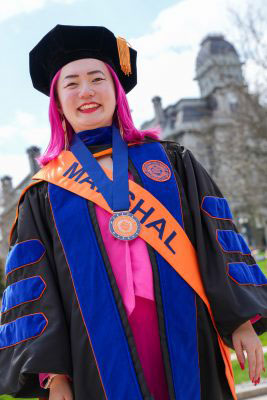Graduate School Marshal Qingyang Liu will graduate on May 11 with a doctoral degree in human development and family science. She was honored recently at the One University Awards with the Chancellor’s Citation for Excellence in Graduate Research. Below, she talks about her five years at Syracuse—what she has accomplished and what her next step will be.

What attracted you to come to Syracuse University to complete your doctorate?
I was drawn to Syracuse University by its strong emphasis on rigorous research and the opportunity to work with Dr. Rachel Razza (associate dean of human dynamics in the Falk College and a professor of human development and family science), a nationally recognized scholar in self-regulation research. Her pioneering work deeply aligned with my own interests in how early poverty shapes children’s self-regulation. From the beginning of my application process, I was intentional about finding a program and mentor that supported both high-quality scholarship and meaningful community impact, and Syracuse offered the ideal environment to pursue both.
Tell me about your area of study within human development and family science in the Falk College.
As a developmental scientist, I adopt a lifespan perspective and use a strength-based approach to understand how children develop self-regulation throughout childhood, especially in the context of early poverty-related stressors. I study how these stressors interact with family dynamics and broader social environments, particularly among racially and ethnically minoritized families living in poverty. As an applied quantitative methodologist, I use advanced statistical methods, such as growth mixture modeling and latent profile analysis, on large-scale national and community-based datasets. These methods help identify critical periods in development when tailored interventions can make the greatest impact for vulnerable populations.
You were recently honored with the Chancellor’s Citation for Excellence in Research at the One University Awards and have appeared in 25 peer-reviewed publications. What can you share about your research and how it has developed during your time at Syracuse?

Across 25 peer-reviewed publications, including six first-authored papers in leading journals, I’ve drawn on large-scale national datasets (e.g., Future of Families and Child Well-being Study, Early Head Start) and community-based mindfulness intervention data to investigate self-regulation pathways among underserved children and youth. At the University, I received rigorous methodological training from faculty mentors, which enabled me to apply person-centered approaches to capture developmental heterogeneity and inform the design of targeted interventions.
What has been most meaningful is how Syracuse University has fostered my interdisciplinary and community-engaged scholarship. I collaborated with faculty across human development and family science, social work and education, contributed to research-practice partnerships and supported local preschool mindful eating workshops, translating findings into actionable insights for families facing adversity. Syracuse University has provided the mentorship, research training and collaborative environment that shaped me as a developmental scientist and applied quantitative methodologist.
What does it mean to you to be the Graduate School’s Class Marshal?
It is a huge honor and a deeply meaningful recognition of the past five years of dedication, perseverance and growth. This milestone reflects the collective support that has carried me through, from the steadfast mentorship and community within human development and family science to the Graduate School’s commitment to graduate student success. I am incredibly grateful for those who have believed in me along the way. I carry this honor with pride and renewed motivation to continue advancing research, equity and community well-being.
What is next for you after graduation?
I will begin a postdoctoral scholar position at Arizona State University, where I’ll continue my research on poverty-related adversity and children’s self-regulation development. I’m excited to expand my methodological training, collaborate with interdisciplinary teams and work closely with community partners to develop research that informs equitable interventions for children and families. I carry the mentorship, training and values I gained at Syracuse University with me into this next chapter.
A Syracuse University News story by Kelly Homan Rodoski originally published on April 20, 2025.
